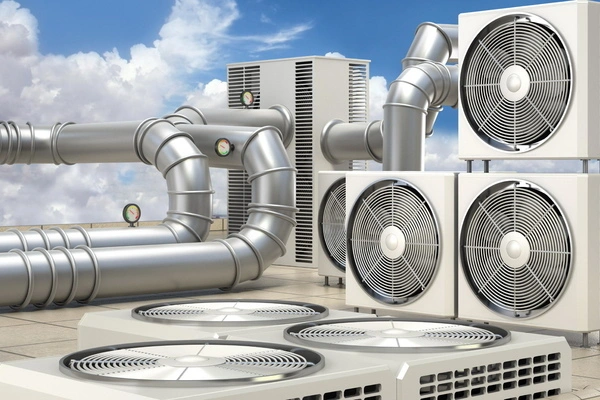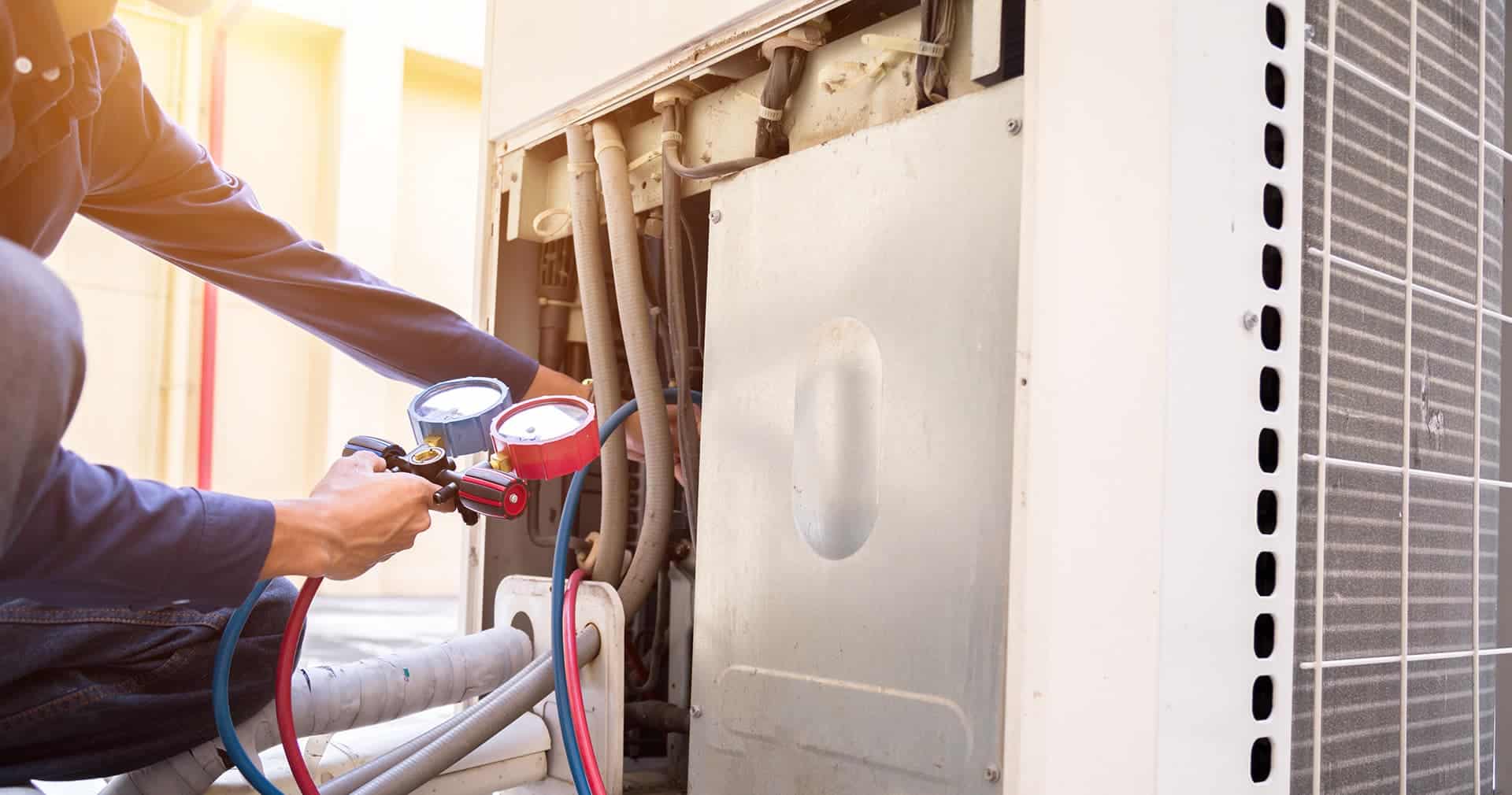Understanding the Different Kinds Of Heating And Cooling System for Ideal Performance
Understanding the various kinds of HVAC systems is essential for homeowners intending to boost convenience and power effectiveness. Central air systems offer uniform temperature level control, while ductless mini-split systems use adaptability. Warmth pumps supply reliable year-round environment administration. For smaller rooms, home window and portable ac system function as practical remedies. Geothermal systems use consistent below ground temperature levels for sustainable cooling and heating. Each option holds one-of-a-kind advantages, prompting a more detailed assessment of which might match private needs best.
Air Conditioning Solutions
Lots of homeowners look for ways to improve interior comfort, comprehending central air conditioning systems is crucial for effective climate control. Air conditioning operates by flowing awesome air via a system of ducts, dispersing it equally throughout the home. This sort of system includes several essential parts, including an outside compressor, an interior evaporator coil, and a network of ductwork.
The compressor cools cooling agent, which after that absorbs warm from interior air as it goes through the evaporator coil. This cooled air is pressed via the ducts and right into living rooms, ensuring a regular temperature. Central air systems are recognized for their performance, frequently utilizing programmable thermostats to enhance power use. Regular maintenance, such as filter changes and system checks, is necessary to assure longevity and efficiency. Comprehending these parts helps property owners make notified choices pertaining to installation and upkeep, eventually improving convenience and power efficiency in their homes.
Ductless Mini-Split Systems
Ductless mini-split systems provide a flexible option to typical main air conditioning, satisfying home owners looking for reliable environment control without the requirement for substantial ductwork. These systems include an outside compressor system and one or even more indoor air-handling devices, permitting targeted cooling and heating in specific areas or areas. This zoning capability enhances comfort by making it possible for customers to readjust temperature levels based on individual preferences, ultimately causing power cost savings.
Installment is usually easier and less intrusive contrasted to ducted systems, which can be helpful for older homes or areas with limited architectural alterations. Furthermore, ductless mini-split systems frequently feature energy-efficient modern technologies, such as inverter-driven compressors, which enhance energy intake based on need. Their small design additionally enables various positioning choices, making them ideal for unconventional or limited areas. Because of this, ductless mini-split systems have actually acquired appeal among homeowners trying to find modern-day, effective cooling and heating services.
Warmth Pumps
Warm pumps represent an energy-efficient and versatile alternative for both heating and cooling residential areas. These systems run by transferring warmth instead of producing it, making them particularly efficient in moderate environments. Throughout warmer months, heat pumps draw out warmth from indoors and launch it outside, providing cooling. Alternatively, in winter, they reverse this process, attracting warm from the outdoors air or ground to warm the interior.
There are 2 key sorts of warm pumps: air-source and ground-source (or geothermal) Air-source heatpump are extra common because Get the facts of their less complex installation and reduced first expense, while ground-source versions flaunt greater efficiency and stability in efficiency. In addition, heat pumps can significantly lower energy expenses and carbon footprints when contrasted to conventional home heating methods, making them a green choice. On the whole, heatpump stand as a compelling option for home owners looking for reliable climate control throughout the year.
Window and Portable Air Conditioners

On the other hand, portable a/c unit offer flexibility, as they can be conveniently moved from space to space. These devices commonly call for an airing vent package to wear down hot air through a window, yet they supply a hassle-free option for momentary cooling requirements.
Both types of a/c unit are suitable for occupants and those looking for to stay clear of extensive setup procedures. Users should consider factors such as BTU ability, power performance rankings, and sound degrees when choosing a system to ensure peak performance for their details area and cooling needs.
Geothermal Heating & Cooling Solutions
As energy efficiency becomes significantly vital, geothermal cooling and heating systems have acquired popularity for their lasting strategy to environment control. These systems make use of the secure temperatures found below ground to offer heating in winter season and air conditioning in summer season. By using the planet's all-natural thermal energy, geothermal systems substantially minimize reliance on fossil gas and reduced utility costs.

In addition, geothermal systems usually call for less site upkeep contrasted to traditional a/c systems, resulting in long-lasting cost savings - HVAC experts. With increasing understanding of environment adjustment, these systems represent a forward-thinking solution for those seeking eco-friendly and effective heating and cooling alternatives
Often Asked Inquiries
Just how Commonly Should I Solution My Cooling And Heating System?
HVAC systems ought to ideally be serviced twice a year, when in the spring and when in the autumn. Routine upkeep aids ensure efficiency, extends lifespan, and avoids pricey failures throughout height use periods.
What Size A/c System Do I Required for My Home?
Identifying the suitable size for an a/c system needs calculating the home's square footage, insulation quality, and environment. A specialist assessment guarantees optimal performance, convenience, and power financial savings customized to the specific demands of the house.
Can I Set Up a Heating And Cooling System Myself?
Installing a HVAC system independently is possible, but it requires technical knowledge and skills. Blunders can cause inefficiency or safety hazards, so speaking with a professional is frequently recommended to guarantee correct installment and conformity with guidelines.
What Are the Indications My A/c System Needs Fixing?
Indications that a cooling and heating system requires repair service include uncommon sounds, inconsistent temperatures, raised power bills, undesirable odors, and regular cycling. Trigger focus to these signs can protect against more damage and guarantee optimal system efficiency.
How Can I Improve My cooling and heating System's Energy Efficiency?
To enhance heating and cooling power effectiveness, one should consistently change filters, seal ducts, mount a programmable thermostat, assurance correct insulation, and timetable routine maintenance checks. HVAC experts. These actions jointly enhance efficiency while reducing power consumption and prices
Central air conditioning systems offer consistent temperature control, while ductless mini-split systems use adaptability. Central air conditioning operates by distributing trendy air through a system of ducts, distributing it uniformly throughout the home. Central air conditioning systems are recognized for their performance, usually making use of programmable thermostats to enhance energy use. click site Ductless mini-split systems use a versatile option to conventional main air conditioning, catering to home owners looking for reliable environment control without the need for extensive ductwork. Geothermal systems usually need much less upkeep contrasted to standard Cooling and heating systems, resulting in long-term cost savings.